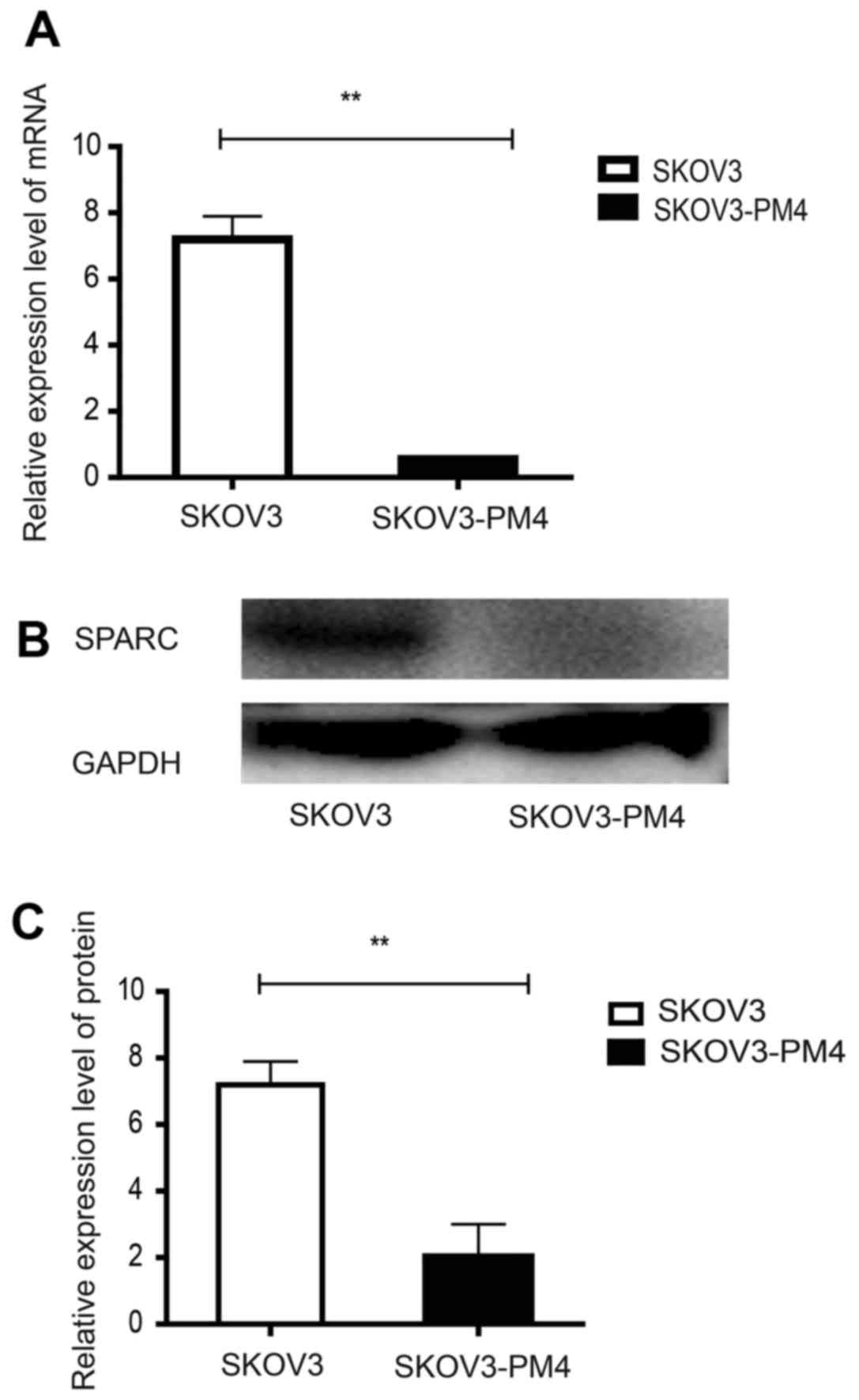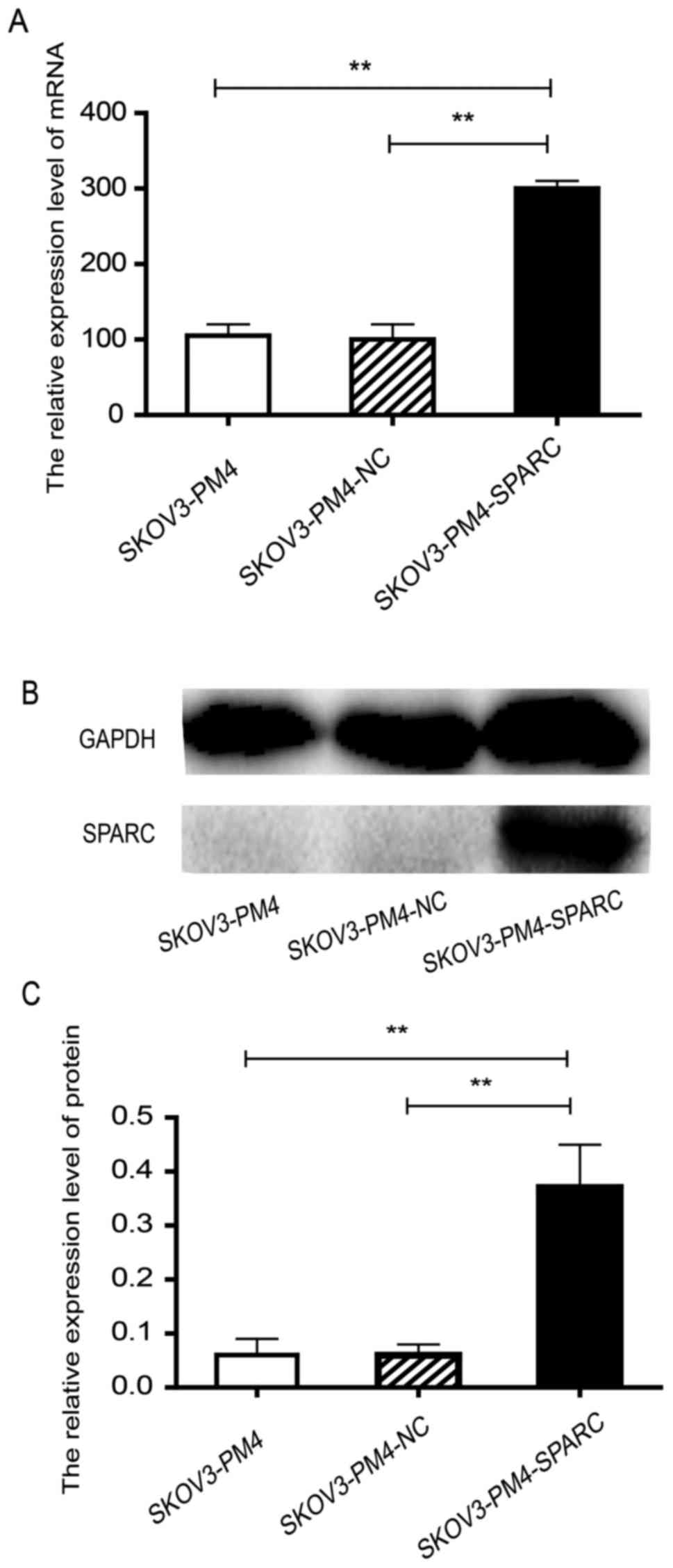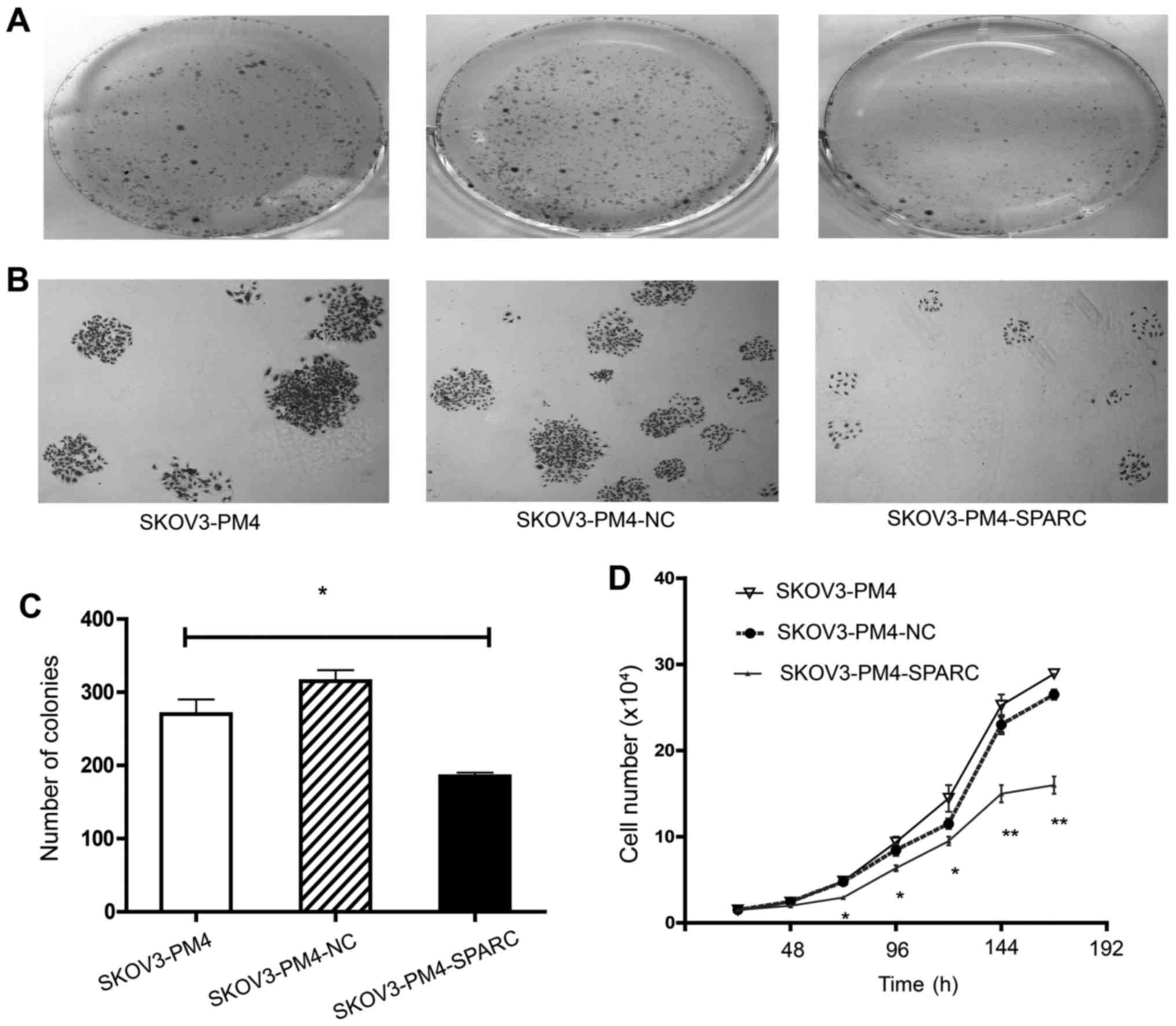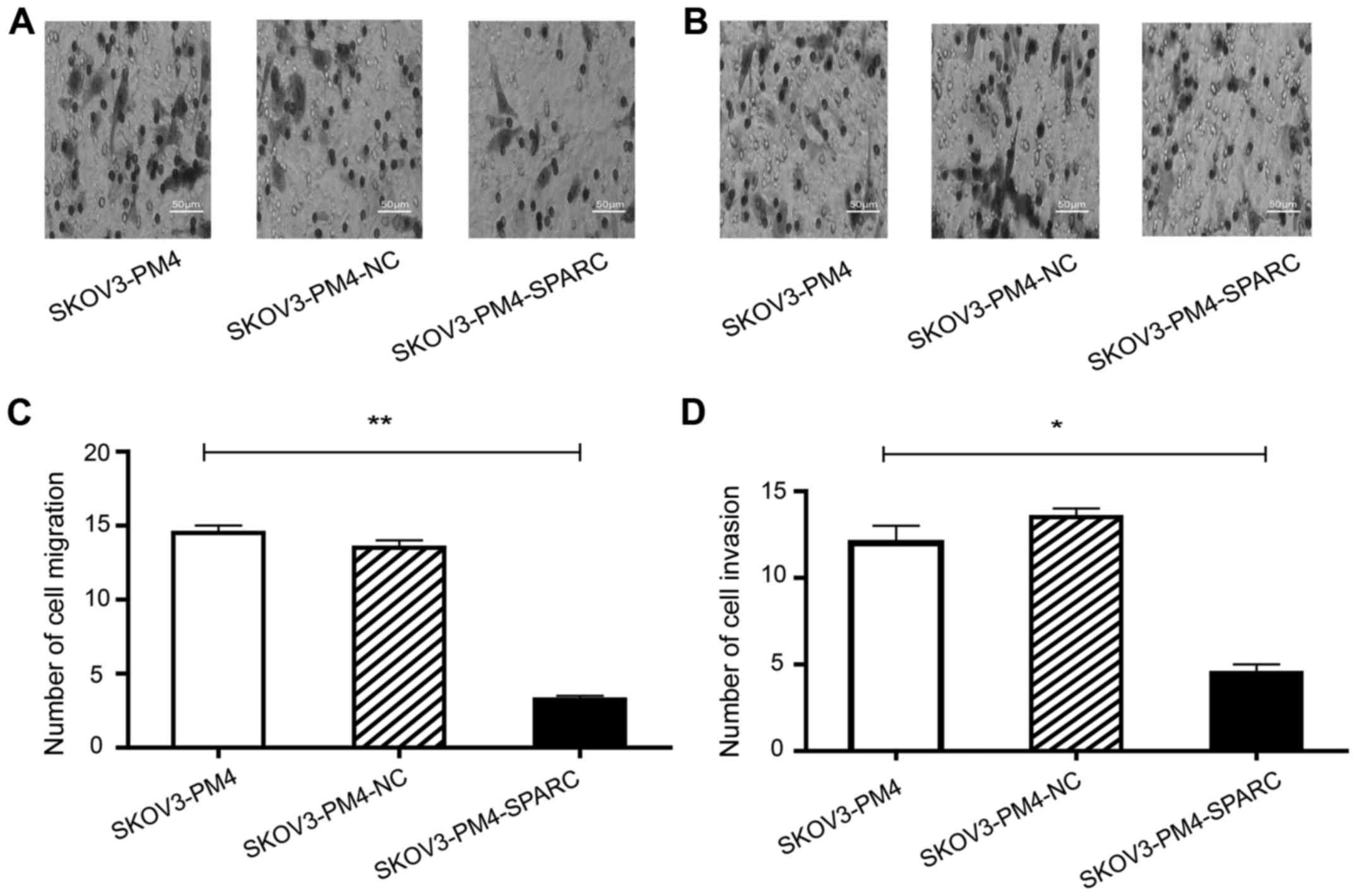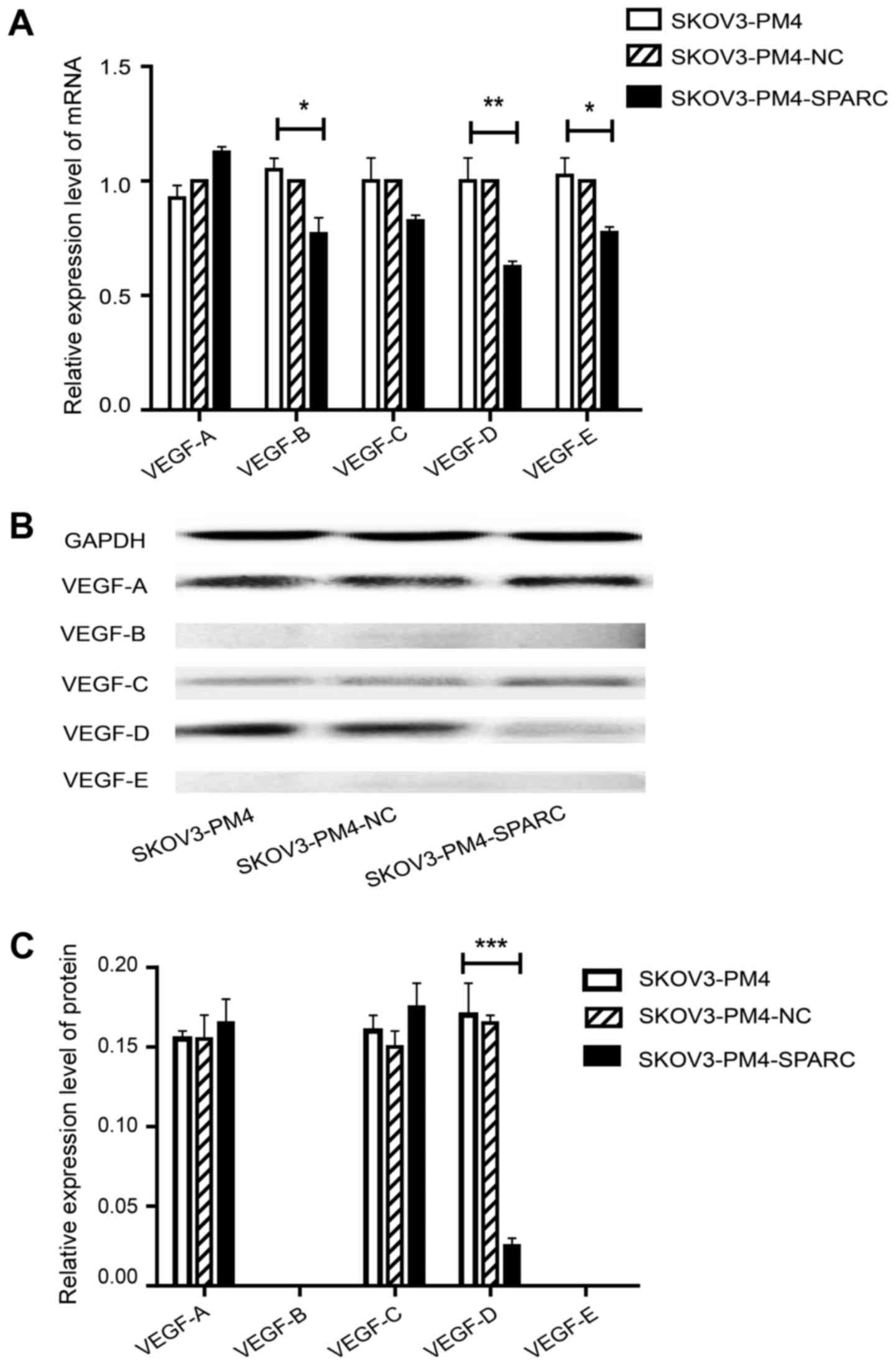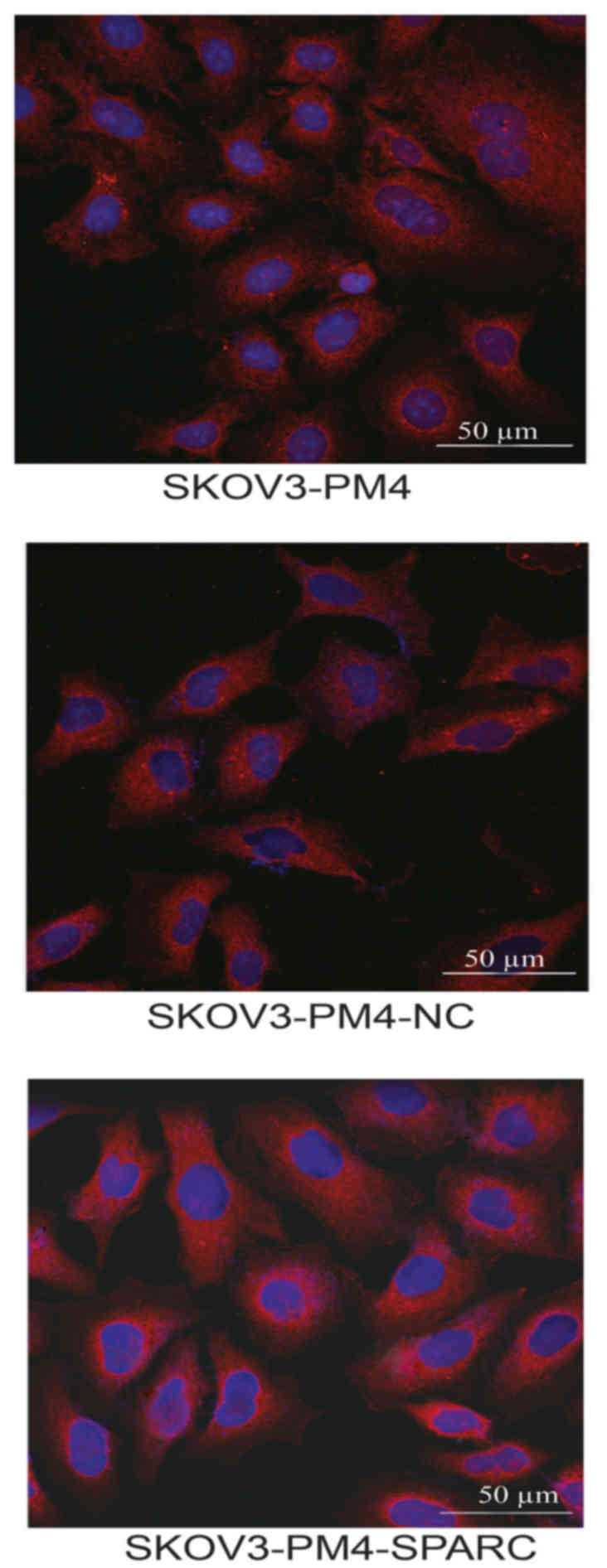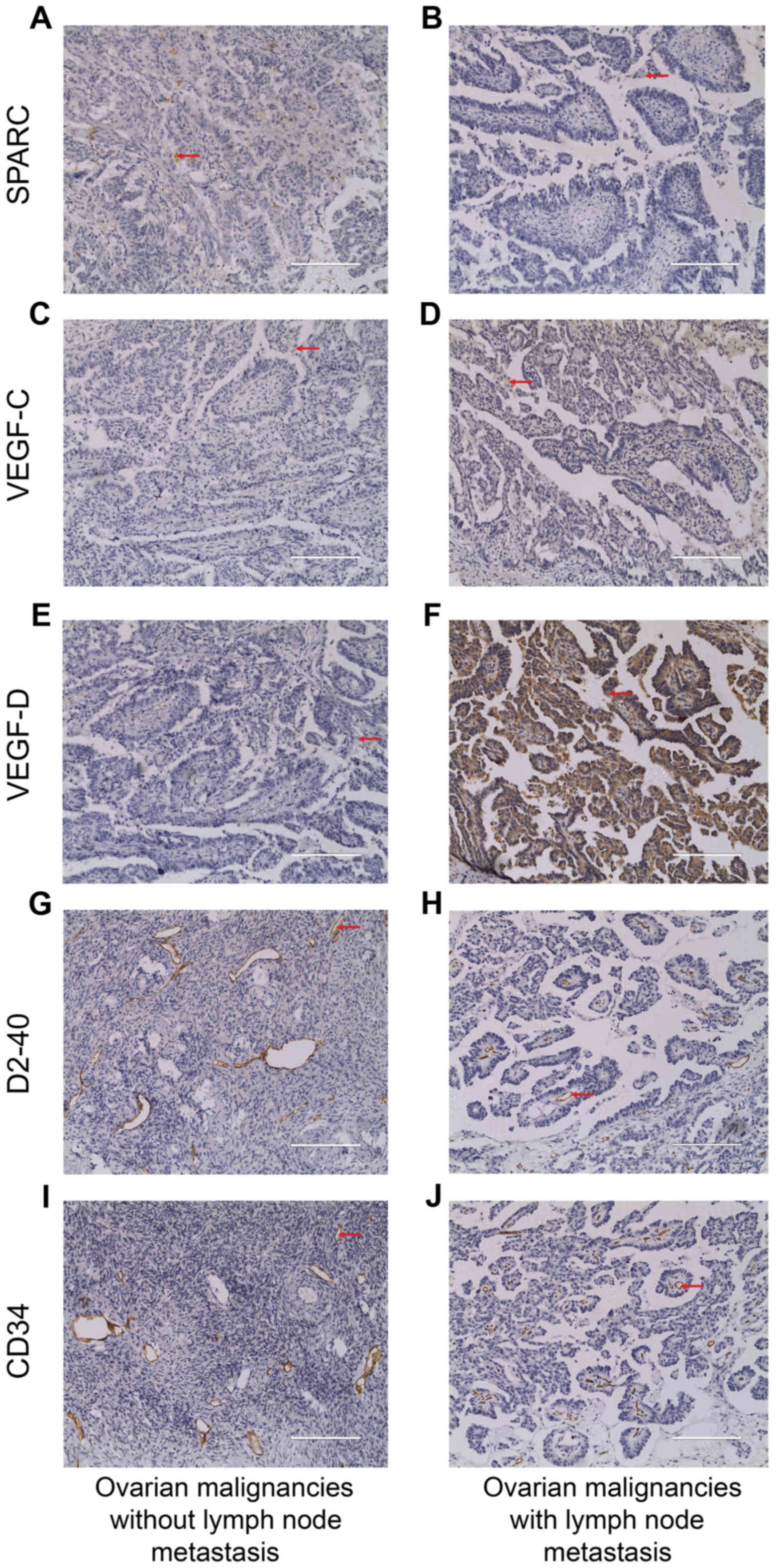|
1
|
Jemal A, Siegel R, Xu J and Ward E: Cancer
statistics, 2010. CA Cancer J Clin. 60:277–300. 2010. View Article : Google Scholar : PubMed/NCBI
|
|
2
|
Lengyel E: Ovarian cancer development and
metastasis. Am J Pathol. 177:1053–1064. 2010. View Article : Google Scholar : PubMed/NCBI
|
|
3
|
Ruan HY, Li DR, Li L, Guan X and Zhang W:
Establishment of human ovarian carcinoma cell lines with
directional highly lymphatic metastasis and study of their
biological characteristics. Zhonghua Fu Chan Ke Za Zhi. 42:482–486.
2007.In Chinese. PubMed/NCBI
|
|
4
|
Zhang XY, Yin FQ, Liu L, Gao T, Ruan HY,
Guan X, Lu YX and Li DR: Effects of HLEC on the secreted proteins
of epithelial ovarian cancer cells prone to metastasize to lymph
nodes. Cancer Biol Med. 10:221–226. 2013.PubMed/NCBI
|
|
5
|
Sage H, Johnson C and Bornstein P:
Characterization of a novel serum albumin-binding glycoprotein
secreted by endothelial cells in culture. J Biol Chem.
259:3993–4007. 1984.PubMed/NCBI
|
|
6
|
Bornstein P and Sage EH: Matricellular
proteins: Extracellular modulators of cell function. Curr Opin Cell
Biol. 14:608–616. 2002. View Article : Google Scholar : PubMed/NCBI
|
|
7
|
Hsiao YH, Lien HC, Hwa HL, Kuo WH, Chang
KJ and Hsieh FJ: SPARC (osteonectin) in breast tumors of different
histologic types and its role in the outcome of invasive ductal
carcinoma. Breast J. 16:305–308. 2010. View Article : Google Scholar : PubMed/NCBI
|
|
8
|
Thomas R, True LD, Bassuk JA, Lange PH and
Vessella RL: Differential expression of osteonectin/SPARC during
human prostate cancer progression. Clin Cancer Res. 6:1140–1149.
2000.PubMed/NCBI
|
|
9
|
Sato T, Oshima T, Yamamoto N, Yamada T,
Hasegawa S, Yukawa N, Numata K, Kunisaki C, Tanaka K, Shiozawa M,
et al: Clinical significance of SPARC gene expression in patients
with gastric cancer. J Surg Oncol. 108:364–368. 2013. View Article : Google Scholar : PubMed/NCBI
|
|
10
|
Chan SK, Griffith OL, Tai IT and Jones SJ:
Meta-analysis of colorectal cancer gene expression profiling
studies identifies consistently reported candidate biomarkers.
Cancer Epidemiol Biomarkers Prev. 17:543–552. 2008. View Article : Google Scholar : PubMed/NCBI
|
|
11
|
Chlenski A, Liu S, Guerrero LJ, Yang Q,
Tian Y, Salwen HR, Zage P and Cohn SL: SPARC expression is
associated with impaired tumor growth, inhibited angiogenesis and
changes in the extracellular matrix. Int J Cancer. 118:310–316.
2006. View Article : Google Scholar
|
|
12
|
Zhang JL, Chen GW, Liu YC, Wang PY, Wang
X, Wan YL, Zhu J, Gao HQ, Yin J, Wang W, et al: Secreted protein
acidic and rich in cysteine (SPARC) suppresses angiogenesis by
down-regulating the expression of VEGF and MMP-7 in gastric cancer.
PLoS One. 7:e446182012. View Article : Google Scholar : PubMed/NCBI
|
|
13
|
Yunker CK, Schultz C, Lemke N, Golembieski
WA, Nelson K, Ojetebbe N, Gutierrez JA, Mikkelsen T and Rempel SA:
SPARC suppresses and inversely correlates with VEGF expression and
secretion in SPARC-transfected U87MG cells and tumors and in
primary xenograft human gliomas. Cancer Res. 66:656. 2006.
|
|
14
|
Van der Auwera I, Cao Y, Tille JC, Pepper
MS, Jackson DG, Fox SB, Harris AL, Dirix LY and Vermeulen PB: First
international consensus on the methodology of lymphangiogenesis
quantification in solid human tumours. Br J Cancer. 95:1611–1625.
2006. View Article : Google Scholar : PubMed/NCBI
|
|
15
|
Tai IT and Tang MJ: SPARC in cancer
biology: Its role in cancer progression and potential for therapy.
Drug Resist Updat. 11:231–246. 2008. View Article : Google Scholar : PubMed/NCBI
|
|
16
|
Kim NI, Kim GE, Lee JS and Park MH: In
phyllodes tumors of the breast expression of SPARC
(osteonectin/BM40) mRNA by in situ hybridization correlates with
protein expression by immunohistochemistry and is associated with
tumor progression. Virchows Arch. 470:91–98. 2017. View Article : Google Scholar
|
|
17
|
Bull Phelps SL, Carbon J, Miller A,
Castro-Rivera E, Arnold S, Brekken RA and Lea JS: Secreted protein
acidic and rich in cysteine as a regulator of murine ovarian cancer
growth and chemosensitivity. Am J Obstet Gynecol. 200:180 e1–7.
2009. View Article : Google Scholar
|
|
18
|
Socha MJ, Said N, Dai Y, Kwong J,
Ramalingam P, Trieu V, Desai N, Mok SC and Motamed K: Aberrant
promoter methylation of SPARC in ovarian cancer. Neoplasia.
11:126–135. 2009. View Article : Google Scholar : PubMed/NCBI
|
|
19
|
Chen J, Wang M, Xi B, Xue J, He D, Zhang J
and Zhao Y: SPARC is a key regulator of proliferation, apoptosis
and invasion in human ovarian cancer. PLoS One. 7:e424132012.
View Article : Google Scholar : PubMed/NCBI
|
|
20
|
Jendraschak E and Sage EH: Regulation of
angiogenesis by SPARC and angiostatin: Implications for tumor cell
biology. Semin Cancer Biol. 7:139–146. 1996. View Article : Google Scholar : PubMed/NCBI
|
|
21
|
Nakamura Y, Yasuoka H, Tsujimoto M,
Kurozumi K, Nakahara M, Nakao K and Kakudo K: Importance of lymph
vessels in gastric cancer: A prognostic indicator in general and a
predictor for lymph node metastasis in early stage cancer. J Clin
Pathol. 59:77–82. 2006. View Article : Google Scholar : PubMed/NCBI
|
|
22
|
Miller JR, Moon RT, Dev G, Cadigan KM,
Nusse R, Hart MJ, Santos RDL, Albert IN and Rubinfeld B: Genes
expressed in human tumor endothelium. Science. 289:1197–1202. 2000.
View Article : Google Scholar
|
|
23
|
Liang JF, Wang HK, Xiao H, Li N, Cheng CX,
Zhao YZ, Ma YB, Gao JZ, Bai RB and Zheng HX: Relationship and
prognostic significance of SPARC and VEGF protein expression in
colon cancer. J Exp Clin Cancer Res. 29:71–81. 2010. View Article : Google Scholar : PubMed/NCBI
|
|
24
|
Du LC, Chen XC, Wang D, Wen YJ, Wang CT,
Wang XM, Kan B, Wei YQ and Zhao X: VEGF-D-induced draining
lymphatic enlargement and tumor lymphangiogenesis promote lymph
node metastasis in a xenograft model of ovarian carcinoma. Reprod
Biol Endocrinol. 12:14–24. 2014. View Article : Google Scholar : PubMed/NCBI
|
|
25
|
Said N, Socha MJ, Olearczyk JJ, Elmarakby
AA, Imig JD and Motamed K: Normalization of the ovarian cancer
microenvironment by SPARC. Mol Cancer Res. 5:1015–1030. 2007.
View Article : Google Scholar : PubMed/NCBI
|
|
26
|
Majumder M, Tutunea-Fatan E, Xin X,
Rodriguez-Torres M, Torres-Garcia J, Wiebe R, Timoshenko AV,
Bhattacharjee RN, Chambers AF and Lala PK: Co-expression of α9β1
integrin and VEGF-D confers lymphatic metastatic ability to a human
breast cancer cell line MDA-MB-468LN. PLoS One. 7:e350942012.
View Article : Google Scholar
|
|
27
|
Hirakawa S, Brown LF, Kodama S, Paavonen
K, Alitalo K and Detmar M: VEGF-C-induced lymphangiogenesis in
sentinel lymph nodes promotes tumor metastasis to distant sites.
Blood. 109:1010–1017. 2007. View Article : Google Scholar
|
|
28
|
Kumar B, Chile SA, Ray KB, Reddy GE,
Addepalli MK, Kumar AS, Ramana V and Rajagopal V: VEGF-C
differentially regulates VEGF-A expression in ocular and cancer
cells; promotes angiogenesis via RhoA mediated pathway.
Angiogenesis. 14:371–380. 2011. View Article : Google Scholar : PubMed/NCBI
|
|
29
|
Bradshaw AD, Reed MJ, Carbon JG, Pinney E,
Brekken RA and Sage EH: Increased fibrovascular invasion of
subcutaneous polyvinyl alcohol sponges in SPARC-null mice. Wound
Repair Regen. 9:522–530. 2001. View Article : Google Scholar
|
|
30
|
Yan M, Schneider J, Gear R, Lu F, LaDow K,
Warshawsky D and Heffelfinger SC: Expression of angiogenic factors
is upregulated in DMBA-induced rat mammary pathologies.
Pathobiology. 71:253–260. 2004. View Article : Google Scholar : PubMed/NCBI
|
|
31
|
Yu H, Zhang S, Zhang R and Zhang L: The
role of VEGF-C/D and Flt-4 in the lymphatic metastasis of
early-stage invasive cervical carcinoma. J Exp Clin Cancer Res.
28:98–103. 2009. View Article : Google Scholar : PubMed/NCBI
|















